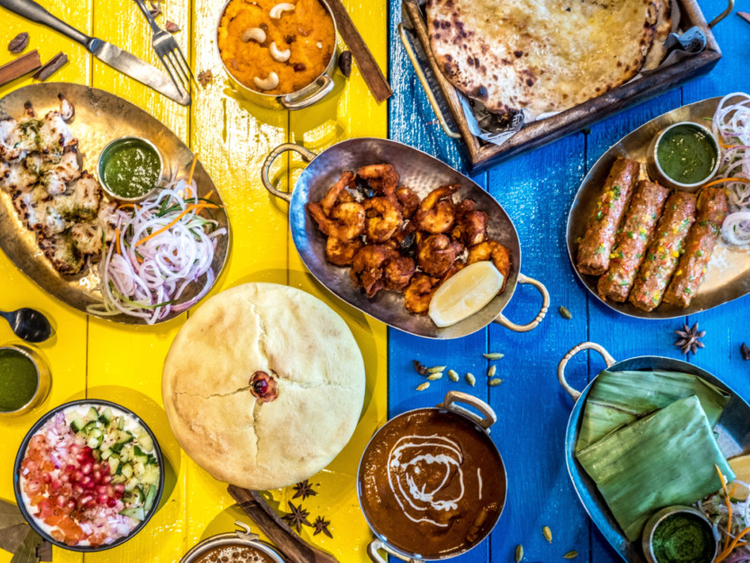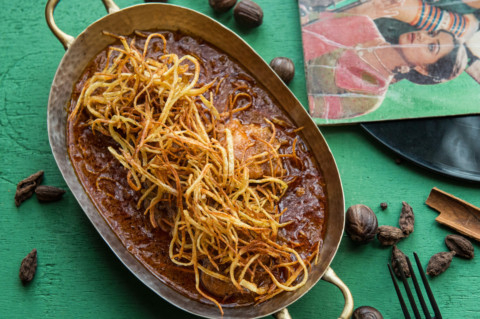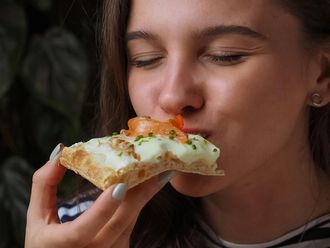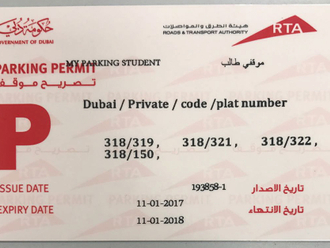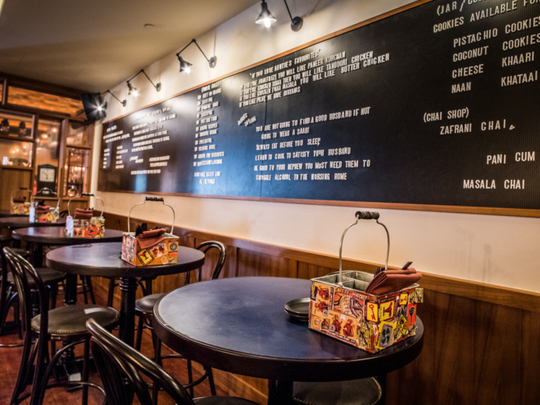
It’s hard to know when to go to a new restaurant: When it has just opened and nobody knows about it yet, when it’s had a launch and is all over your Instagram feed, or when it’s had a few months to find its feet and get its menu in gear? For Dubai, being what it is, that last option might be too late so we accepted an invite to Moombai & Co a few weeks ago.
This retro ’60s venue at the top of Shaikh Zayed Road is the newest Indian restaurant in town (but not for long, with Masti Dubai set to open soon — but more on that in another piece).
But first... a history lesson
Moombai & Co aims to serve up a piece of Bombay — before the name was changed to Mumbai — and of its nearly vanished Irani bakery cafés. At their height in the and eighties, when life was slower and more laid-back, diners could stop by here for a midmorning snack of bun-maska (buttered fresh buns), a teatime repast of cake and chicken patties (mildly spiced chicken encased in flaky puff pastry), or even a full meal of patra ni macchi (fish steamed in banana leaves), salli marghi (chicken curry with potato sticks) and mutton dhansak (a meat curry of four lentils and up to a dozen spices).
These restaurants, concentrated around the southern end of Bombay, were run by Zoroastrian emigrants from Iran — called Parsis or Iranis — who arrived in India in two waves some 900 years apart. Both of these colourful communities brought their own recipes with them, but over the centuries, their kitchens were also influenced by the Indian states they settled in — modern-day Gujarat and Maharashtra.
Moombai & Co attempts to showcase the wealth of this cuisine in a market saturated with North Indian restaurants, with a menu that extends to the city’s street food.
Rickshaws in a Bombay club?
As someone who remembers the Bombay this restaurant channels, I’m delighted by the bustling atmosphere — straight away, it’s a cross between the Cricket Club of India and a Parsi restaurant in Mumbai’s Fort area and I’m almost at home.
My friend, a Parsi who’s lived in Dubai for a decade, peruses the menu in delight as I snap photos of the bright, idiosyncratic interiors — from the retro armchairs and the Bollywood posters to the list of don’ts on the blackboard (No Combing Hair, says one, and inexplicably, No Laughing, says another).
There are quibbles (a rickshaw is out of place — South Bombay has no rickshaws), but hey, innovation and compromise are integral to Mumbai’s spirit.
But what's the food like?
While we wait for our order, we dip into a serving of rice papads with three chutneys — a clean and balanced pineapple dip, a classic jammy mango and a rather pedestrian chilli pickle.
The Tareli Kolmi — prawns in a ginger garlic marinade — are just a shade too done, but are beautifully spiced. They’re crisp but relatively tender, and go perfectly with a long tall drink. Less successful, though, are the onion bhaji — they’re rather too dense for me but they win points for being gluten free and being served in a highway-style paper cone. (Overall, the presentation is fantastic, with plenty of brassware and earthenware — but a little more attention could have been paid to menu development).
My friend’s not pleased with her akuri cheese toast either — the toast has become too soggy and she says it needs akuri paste.
For our mains, we pick and mix from the different influences of this melting pot menu. First, we try another Parsi classic — the community puts eggs in everything, the joke goes, so we order the bheeda par eeda — okra with a fried egg. Odd as that may sound, it’s an excellent combination. Although the egg is perfectly runny, the okra betrays its origins — it’s the desert variety, not the tender vegetables that grow in Maharashtra’s loamy soil. Close, my Parsi friend says, but no cigar.
Other dishes fare better. The steamed Patrani macchi is memorable — the herby piquant chutney flavours the fish beautifully, though the fish could have been juicier.
The Parda seekh kebab — minced lamb ‘curtained’ in chopped onions, peppers and coriander — takes me straight back to Mumbai’s food streets. These aren’t gently infused Lucknow-style kebabs, they’re rough and ready city slickers.
A Sindhi kadhi, or curry, nods to that other great ethnic group of post-partition immigrants to Mumbai, and could have come from one of the homes of my Sindhi classmates — its gram flour base perfectly offsets the assortment of vegetables. It’s hearty, spicy and very moreish.
We close with a glass of falooda. The classic dessert is a rose milkshake crammed with vermicelli, jelly, ice cream, sweet basil seeds and agar agar, and Moombai & Co’s version, though nowhere near South Mumbai’s Badshah version of old, is one I know I’ll come back for.
Nostalgia, after all, is a tough critic.
The details
Location: The H Hotel, Shaikh Zayed Road
Price: Approximately Dh400 per couple
Timings: Open daily from 11am to 12am



